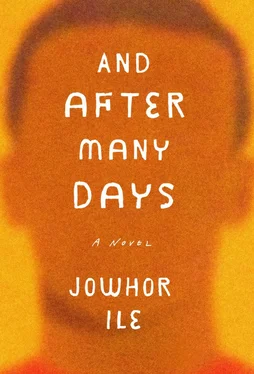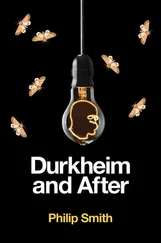“Do you know the name?” Ajie asked as they watched the bird fly away.
“Kpamboy,” Ossai replied.
Ajie thought it might be a gray hornbill. “I wonder what it’s called in English…not too sure,” he said under his breath. The gray hornbill had yellow feet, but this one’s feet were black. Ma’s Encyclopaedia of Tropical Birds covered a wide range of species and had colored pictures. Ajie and Paul used to play Spot and Name and often had unresolved arguments over shades of plumage, length of tail, and birdcall. Ma, who was expected to have the last say in these matters, said that some of the species they found in Ogibah may not have been named in English. This response was unsatisfactory in the competitive atmosphere. “The rain forest,” Ma would continue importantly, “supports the highest diversity of all living organisms the world over.” She would transform into the schoolmistress before her classroom, a biology teacher dressed in calf-length georgette skirt and chiffon blouse, with a chalk in one hand and an efficient duster in the other.
Ahead, on top of a rotting palm trunk, a squirrel in its perfect camouflage coat stretched out, calm, disregarding. Ajie picked up a stone and aimed.
“The head is mine if you hit.”
“I’ll have to knock it dead first.”
“The head is mine if you hit, like I said.” Ossai waited for the shot. “And you’ll need a bigger stone if you intend to harm it at all.”
A siren went off that startled both Ajie and the squirrel. “Oh no!” Ajie shouted.
“It’s ten o’clock,” Ossai said.
“Where is it coming from?” Ajie asked.
Ossai felt the clothes to see if they were dry. The khaki shorts had a starched stiffness to them. He folded the washed clothes into the cellophane bag, hopped into the fresh shorts he’d brought along, put his shirt on, and left the button undone. “Base Camp,” he replied.
“When did they start blowing this siren? I don’t think I heard it when we came last year.”
“Not sure when it started, but it’s every Tuesday morning now, by ten. My father said it’s a signal for the engineers to rest their drilling machines.”
“Really?” Ajie said. “I’ll ask Bendic when we get home.”
“He will know better,” Ossai said. “My father is just a night watchman at the Location.”
“That doesn’t mean he can’t know why,” Ajie said softly. “I just want to hear what Bendic will say.”
They came out of the bush, and the sun bore down on them as they walked toward the school. The sun had baked everything it could reach, and the ground ahead of them shifted like steaming fluid.
“I’m sure by now they’ll be looking for you.”
“They won’t. It’s our holiday, and I can go anywhere I want,” Ajie said. He wasn’t some soft city boy who couldn’t be away for a minute without being missed.
“Okay, then. Will you follow me to my house so I can check something for my mother?”
“Okay.”
“I’ll come back with you to your house.”
“Okay.”
—
Loud voices were already coming from Bendic’s parlor as Ajie and Ossai came up the stairs. Ajie knew the parlor would be packed full of people. Bicycles were parked beside the door downstairs, and they both went upstairs and Ajie opened the door a bit, put his face through the screen door and scanned the crowd of men sitting.
Paul was with the young men who stood at the back. His bright blue T-shirt stood out among the tired old ones the others wore. Still, standing there with his face set and attentive, he was very much part of the group. When Ajie asked Paul later that evening what the meeting was about, Paul explained. “Company wants to give Ogibah one million naira for the new yam festival celebration.” Ajie was in bed listening to Paul, who was in his own bed across the room.
“They want to build gas pipelines, too, and some people’s farms and houses would be affected. They want to pay compensation. Mark thinks they should be made to wait. That if they give them an easy way, they would take us for granted, like they did in the past. He said, ‘Why is it okay for them to take all the resources in our land, destroy our homes, and leave us with nothing?’ But people think they are going about trying to buy off individuals rather than dealing with the whole community as one. People suspect Nwokwe is Company’s inside man, although he denies it.
“Others suggested we accept the money and buy cows with it and share among everyone for the festival. Whether we accept their terms is another matter. Someone cautioned them to bear in mind that it is the devil we are dining with here; we should therefore use a long spoon. These people have government on their side. They look like they are asking us, but they are not; they prefer to indulge us, at least. If any commotions come out here, then you will see who will come to battle. Everyone here knows you cannot fight government. No medicine can kill government. They will burn a holy shrine and go scot-free: something an ordinary person would do and not last the hour without falling down dead.
“Are you asleep?” Paul asked.
“No,” Ajie replied, “I’m listening.”
There was a faint distant drumming from the night. It could have been coming from another village, although as Ajie slid toward sleep, the drumming advanced and retreated, as if emanating from the farthest quarters of Ogibah or close to his window or the room next door, where Bibi was asleep.
Ajie had barely set eyes on Bibi throughout the day. They separated each time they came to Ogibah: They became boys and girls, each doing his or her own thing. Bibi had come in sometime that afternoon to ask Ma for a George wrapper and scarf for a dance practice she was taking part in. She had beads around her left ankle and on her wrists, and she had applied talcum powder all around the length of her neck and on the top of her chest and back. She would have looked really idiotic had they not been in Ogibah.
Did someone give birth? Ajie wanted to ask, but didn’t. He would have heard the singing if there were a newborn. The showering of powder, the party of family and friends singing, dancing, and ringing bells from one end of the village to the next was always a rowdy affair.
“I am organizing a sports competition tomorrow,” Bibi said to Ajie. “But you have to register if you want to participate.” With her head-girl initiative, she had formed a committee of organizers and given leadership posts to some. “It’s for both boys and girls,” Bibi added before Ajie could say he wasn’t interested.
The distant drumming of the night persisted, and Ajie thought he could make out voices, but he couldn’t tell if it was just his own mind already in the zone, tilting on the edge of sleep, and conjuring up things. There were the three of them, Ajie thought, Paul, Bibi, and him. Before the beginning of his memory, which was to say from the beginning of this life, there had always been the three of them. Paul and Bibi were the first people he saw, the first he touched. Everything he resented and liked, everything he knew, thought, and felt, his smile and the angry pounding in his veins, were all from them, and now, for the first time, taking notice of this made him feel incredibly lonely. The sort of lonely feeling that Bibi would have been tempted to slap out of him. Just the kind of thing that would have made Paul look at him in his usual bemused way and say, “My friend, what are you saying? Please be serious.” But he sensed it that night, it hung about the room, the feeling that things may not always be like this, that they would one day grow up and live across town from each other, like Ma and her cousin Auntie Julie, or even die, like all of Bendic’s siblings, whom he hardly ever spoke of.
Читать дальше












